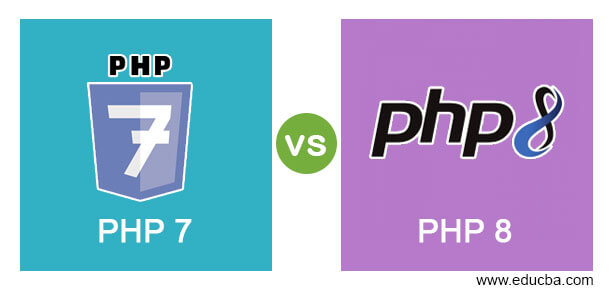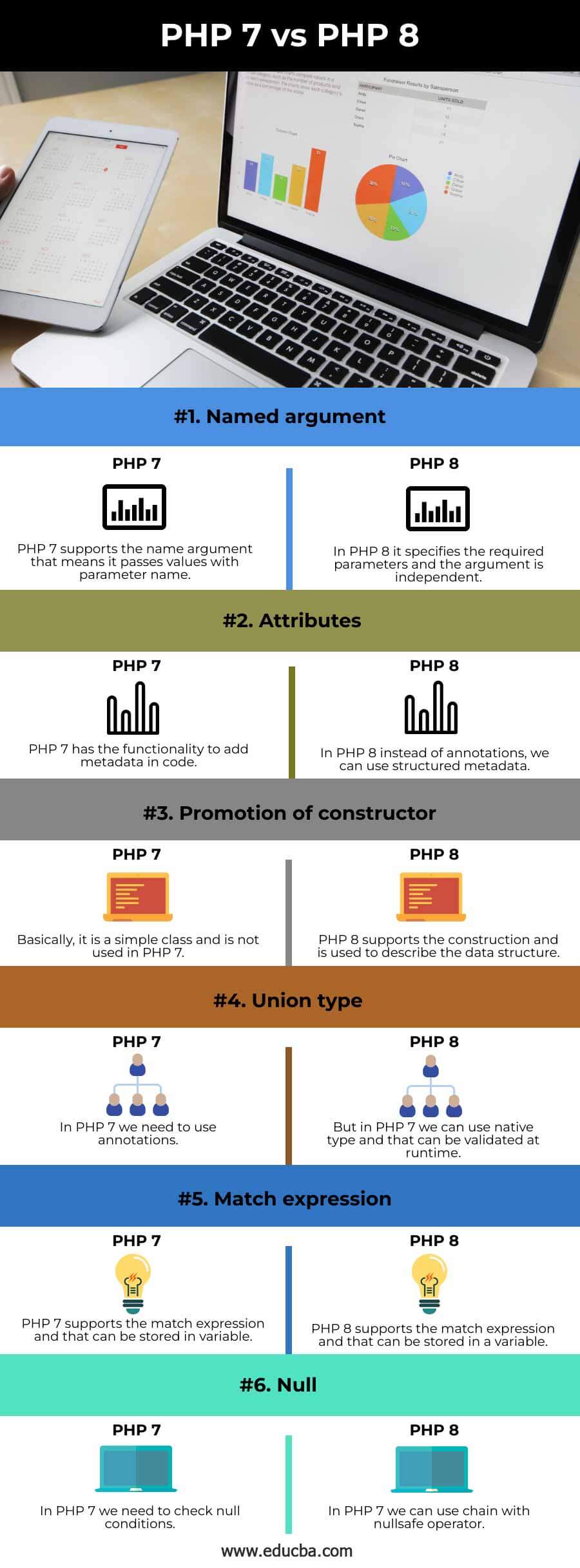Updated June 12, 2023

Difference Between PHP 7 vs PHP 8
The following article provides an outline for PHP 7 vs PHP 8. PHP is a harsh side scripting language used to make dynamic programming. Therefore, PHP 7 is faster than other versions of PHP. After all, we viewed PHP 7 as quicker for the Aerospike PHP Client because we utilize a lot of hash tables at the C level. Therefore, the new hash table execution of the Zend Engine is more productive than the past execution. On the other hand, PHP 8 introduced new features such as different expressions, attributes, null operators, and error handling; it also provides the consistency feature.
Now let’s see PHP 7 as follows:
- The feature change related to PHP 7 is a critical improvement in execution. Generally, two times as quick as PHP 5.6, PHP 7 can rival present-day contenders to pure PHP, like Facebook’s HipHop Virtual Machine (HHVM). For Drupal clients, PHP 7 offers considerably quicker execution than HHVM, with the advantage of not expecting to utilize a virtual machine to execute the PHP source code. Additionally, when PHP 7 suddenly spikes in demand for WordPress 4.1.1, it can execute two times as many solicitations each second as a similar stage running PHP 5.6. Notwithstanding better execution, the accompanying specialized changes show up in PHP 7. Designers ought to acquaint themselves.
- PHP 7 is a significant arrival in PHP programming language and is promoted to be a transformation in how web applications can be created and conveyed for versatile ventures and the cloud. This delivery is viewed as the main change for PHP after the arrival of PHP 5 in 2004.
Now let’s see PHP 8 as follows:
- PHP 8 was delivered toward the finish of November 2020! It is one of the world’s most famous programming languages, utilized by web engineers all over the planet. With PHP 8, various new highlights make it a great fit for huge scope venture applications, including web administrations, miniature administrations, and applications that suddenly spike demand for the cloud.
- The language also upholds object-arranged programming, dynamic composing, and practical programming, opening up additional design opportunities. PHP 8 will be much quicker than PHP 7 in light of the new offbeat plan and JIT compiler; you will want to construct non-concurrent applications in PHP 8, which is nothing to joke about for sites.
Head-to-Head Comparison Between PHP 7 vs PHP 8 (Infographics)
Below are the top 6 differences between PHP 7 vs PHP 8:
Key Difference Between PHP 7 vs PHP 8
Now let’s see the key differences between PHP 7 and PHP 8 as follows:
Features of PHP 7 are as follows:
- Performance: PHP 7 contains the PHPNG code, so it performs better than PHP 5.
- Less memory utilization: PHP 7 required less memory for execution.
- Scalar sort presentations: Now, boundary and return types can be upheld.
- It supports 64-bit: Basically, it consistently supports the 64-bit machine.
- Improvement of exception: Compared to another version, it has improved in exception handling.
- Numerous deadly mistakes changed over to exceptions: The range of exemptions is expanded, covering numerous lethal blunders changed over as special cases.
- Secure arbitrary number generator: Addition of new secure irregular number generator API.
- Expostulated SAPIs and expansions eliminated: Various old and unsupported SAPIs and augmentations are removed from the most recent form.
- The invalid mixing administrator: New invalid mixing administrator was added.
- Declarations: Support for the return type and boundary type added.
- Mysterious classes: Support for unknown added.
- Zero expense states: Support for zero expense declared added.
Features of PHP 8 are as follows:
- Promotion of constructor property: Basically, it supports the object programming concepts such as public, protected, and private.
- Negative array index: In PHP 8, we can start the negative array index that is less than 0.
- For example: $A = array(-2, 1);
- Union type: In PHP 8, we have the functionality to accept values in different types.
- Consistent: When we try to pass parameters in from different types at that time, it throws the type error, so this problem is handled in PHP 8.
- Maps: It is also called a weak map; it is nothing but the object, which means it is weakly referenced. So PHP 8 provides support for such a situation.
- Attribute: In PHP 8, we have the functionality to add the metadata.
- Name argument: PHP 8 provides a new way to pass the argument to the function.
- Ex: specified function name(name: $required value);
PHP 7 vs PHP 8 Comparison Table
Let’s discuss the top comparison between PHP 7 vs PHP 8:
| Argument | PHP 7 |
PHP 8 |
| Named argument | PHP 7 supports the name argument, which means it passes values with the parameter name. | PHP 8 specifies the required parameters, and the argument is independent. |
| Attributes | PHP 7 has the functionality to add metadata to code. | In PHP 8, instead of annotations, we can use structured metadata. |
| Promotion of constructor | It is a simple class and is not used in PHP 7. | PHP 8 supports the construction and is used to describe the data structure. |
| Union type | In PHP 7, we need to use annotations. | But in PHP 7, we can use the native type that can be validated at runtime. |
| Match expression | PHP 7 supports the match expression, which can be stored in variables. | PHP 8 supports the match expression that can be stored in a variable. |
| Null | In PHP 7, we need to check null conditions. | In PHP 7, we can use chain with nullsafe operator. |
Conclusion
From the above article, we have taken in the essential idea of PHP 7 vs PHP 8, and we also saw the representation and example of PHP 7 vs PHP 8. From this article, we saw how and when we use PHP 7 vs PHP 8.
Recommended Articles
This is a guide to PHP 7 vs PHP 8. Here we discuss PHP 7 vs PHP 8 key differences with infographics and a comparison table. You may also have a look at the following articles to learn more –

